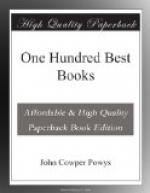The necessary matter, in other words, at the beginning of such a tremendous adventure as this blowing wind into the sails of a newly built little schooner, or sometimes even of a poor rain-soaked harbor-rotten brig, bound for the Fortunate Islands, is the inspiration of the right mood, the right tone, the right temper, for the splendid voyage. It is not enough simply to say “acquire aesthetic severity.” With spoils so inexhaustible offered to us on every side, some more definite orientation is desirable. Such an orientation, limiting the enormous scope of the enterprise, within the sphere of the possible, can only be wisely found in a person’s own individual taste; but since such a taste is, obviously, in a measure “acquired,” the compiler of any list of books must endeavor, by a frank and almost shameless assertion of his taste, to rouse to a divergent reciprocity the latent taste, still embryotic, perhaps, and quite inchoate, of the young person anxious to make some sort of a start. Such a neophyte in the long voyage—a voyage not without its reefs and shoals—will be much more stirringly provoked to steer with a bold firm hand, even by the angry reaction he may feel from such suggestions, than by a dull academic chart—professing tedious judicial impartiality—of all the continents, promontories, and islands, marked on the official map.
One does not trust youth enough, that is in short what is the matter with our educational method, in this part of it at least, which concerns “what one is to read.” One teases oneself too much, and one’s infants, too, poor darlings, with what might be called the “scholastic-veneration-cult”; the cult, namely, of becoming a superior person by reading the best authors. It comes back, after all, to what your young person emphatically is, in himself, independent of all this acquiring. If he has the responsive chord, the answering vibration, he may well get more imaginative stimulus from reading “Alice in Wonderland,” than from all the Upanishads and Niebelungenlieds in the world. It is a matter of the imagination, and to the question “What is one to read?” the best reply must always be the most personal: “Whatever profoundly and permanently stimulates your imagination.” The list of books which follows in this volume constitutes in itself, in the mere perusal of the titles, such a potential stimulation. A reader who demands, for instance, why George Eliot is omitted, and Oliver Onions included; why Sophocles is excluded and Catullus admitted, is brought face to face with that essential right of personal choice in these high matters, which is not only the foundation of all thrilling interest in literature, but the very ground and soil of all-powerful literary creation. The secret of the art of literary taste, may it not be found to be nothing else than the secret of the art of life itself—I mean the capacity for discovering the real fatality, the real predestined direction of one’s intrinsic nature and the refusal, when this is found, to waste one’s energies in alien paths and irrelevant junketings?




